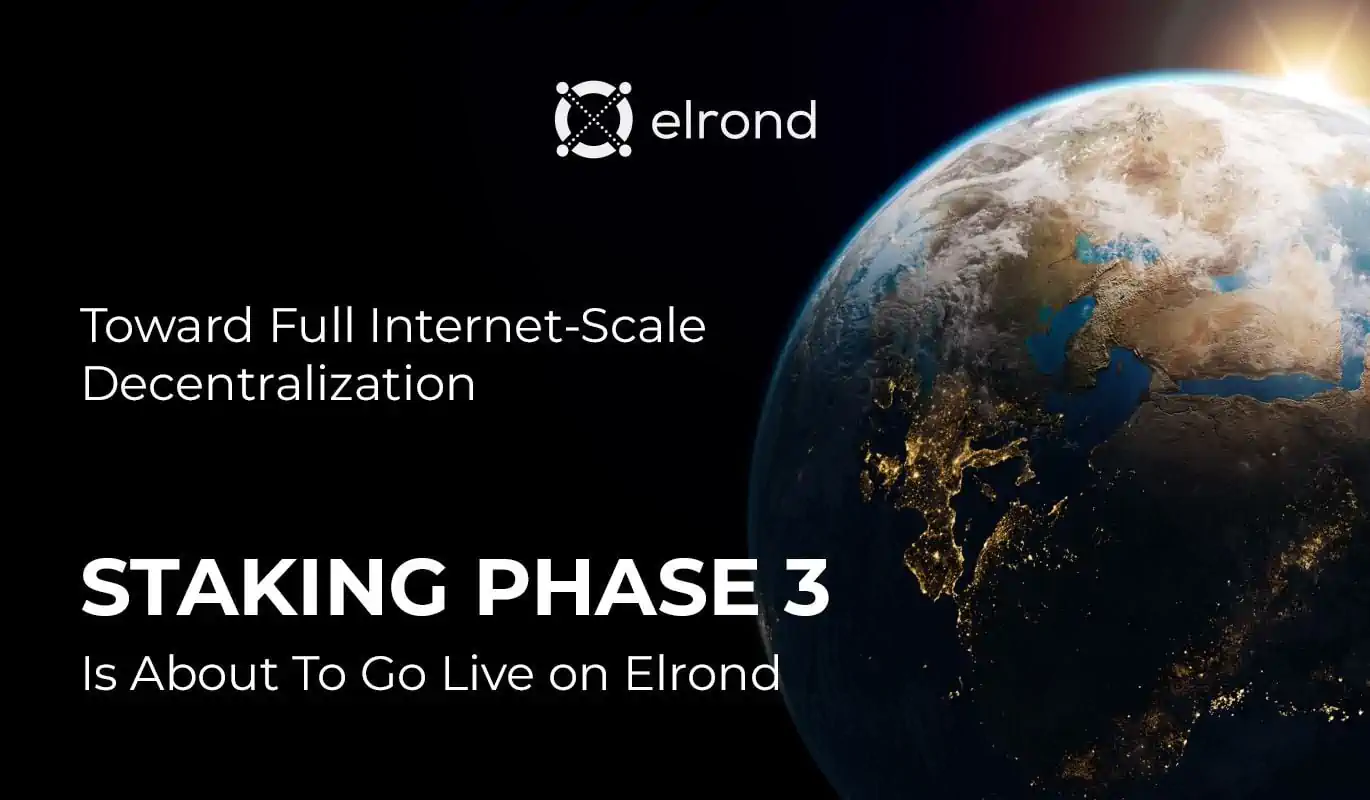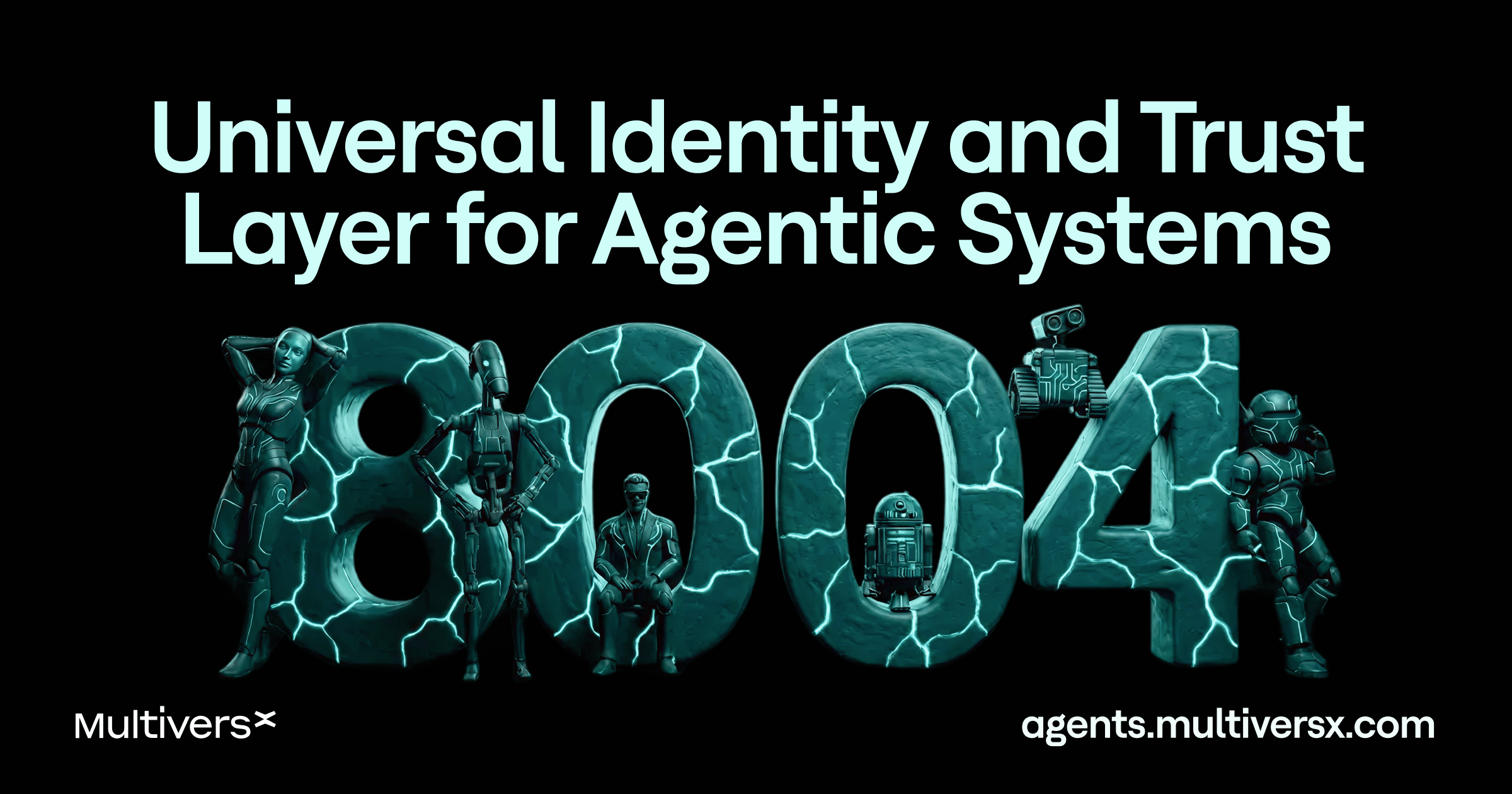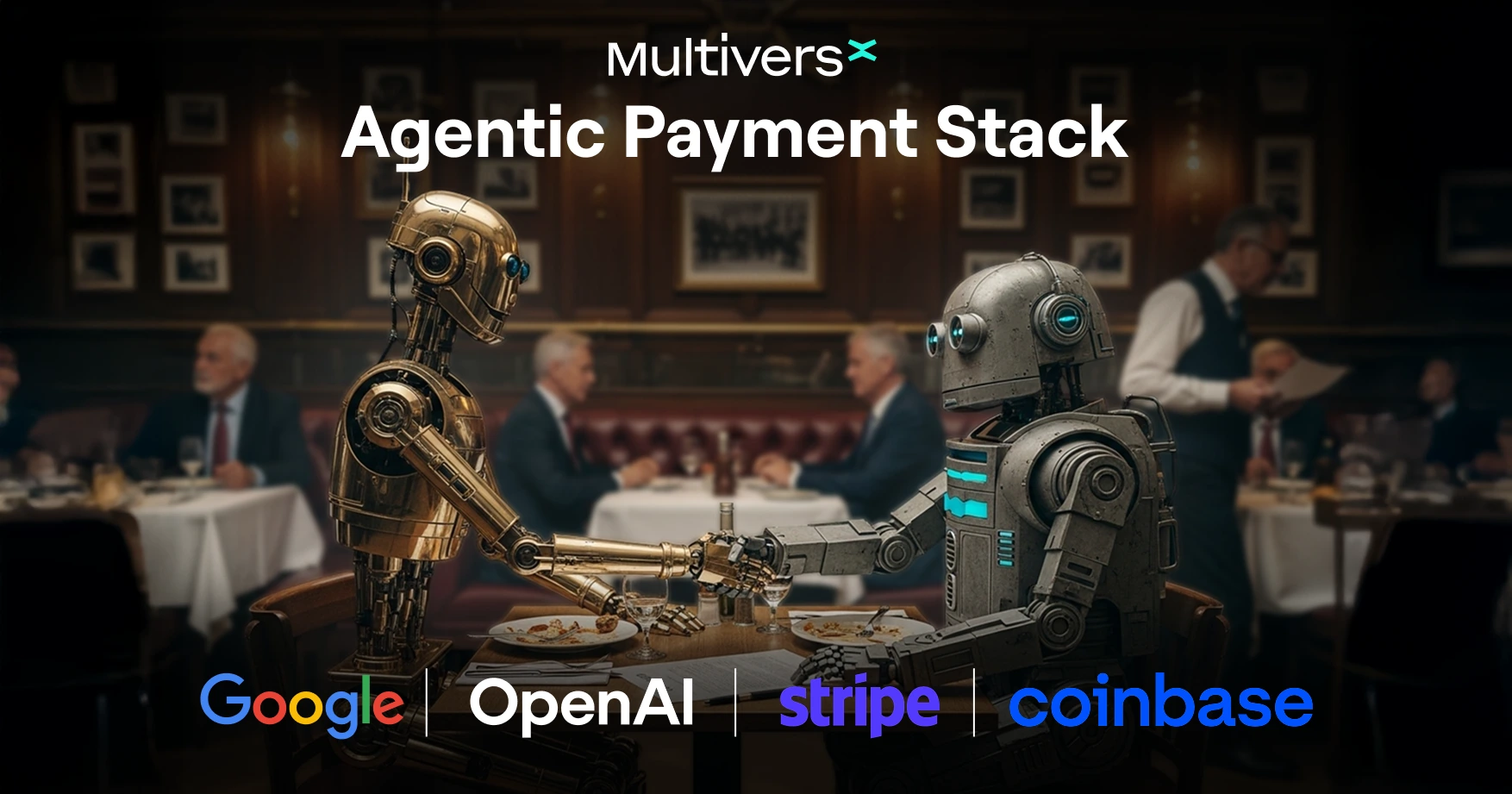

Toward Full Internet-Scale Decentralization: Staking Phase 3 Is About To Go Live on Elrond

The Elrond network is live and open source, setting a remarkable standard in the performance that it brings to the blockchain space. The Elrond DeFi 2.0 module is also coming live soon and will feature a new set of financial microservices, capable of processing transactions at an internet-scale, and opening a new adoption space by making these microservices accessible by nations, institutions, banks, businesses, and individuals.
To strengthen the network and prepare it for this new phase, following a thoughtful conversation around the Phase 3 staking proposal, we are finally ready to commence another step toward full decentralization of the Elrond network.
The changes that are coming are meant to open a new era of growth for Elrond, specifically increasing the token distribution and decentralization, strengthening the security of the network, and enabling sustainable business models around staking-as-a-service providers. In short, by enabling more eGold to be staked, more people and validators will participate, more tokens will be locked, security will improve by increasing the cost of potential attacks. A secure environment will give confidence to more businesses to start building on Elrond, increasing the demand of eGold, in a perpetual virtuous circle.
This is why we are excited to announce the imminent transition to Staking Phase 3.
The most important changes:
- Staking Providers can offer non-custodial delegation services
- Staking Pools creation tentative 22 March
- More Validator nodes: increased from 2169 to 3200
- Max node increase activation tentative 05 April
- Staking will be available also through Maiar
- Waiting List APY change to 6%, starting with 05 April, ending completely 03 May
1. Important Components of Phase 3 Staking
Introducing Staking Pools
A staking pool is defined as the combination of a system delegation smart contract, the associated nodes, and the funds staked in the pool by participants. Node operators can set up a staking pool for one or more nodes, which can then be funded via delegation by anyone in exchange for a proportion of the validator rewards.
A staking pool requires 1250 eGold deposited by the node operator at the moment of its creation. 2500 eGold are required to stake a single validator node and start earning rewards. Activating more nodes inside a staking pool requires multiples of 2500 eGold for the base stake. Everything extra is considered as “top-up”.
Staking pools were first introduced in this blog post: https://elrond.com/blog/elrond-delegation-manager/
Base Stake and Top-Up
The “base stake” represents the 2500 eGold required to run a Validator node. This is fixed and does not change as we transition to Phase 3.
The “top-up” represents additional eGold staked on top of a Validator node directly, or in a Staking Pool.
Adding more eGold as top-up will earn you more rewards, but the average APR will gradually decrease as you increase the top-up amount. For example, it will be more profitable to run 2 Validator nodes with 2500 eGold each than 1 Validator node with 5000 eGold. Considering the current demand, it is likely that most Validator nodes will have at least some top-up.
Top-up is useful for compounding rewards from staking or delegation.
You can find more details here: https://forum.elrond.com/topic/667-it’s-time-to-grow-phase-3-staking-proposal/
Delegation Manager
We embedded the most important staking mechanisms directly into the protocol. The “Delegation Manager” is the part of the protocol responsible for managing those mechanisms.
Simply put, every Staking Provider has the option to create their own delegation system smart contract. This will be a smart contract that is 1:1 equivalent in code with a pre-audited template. Only the parameters, such as service fee and maximum delegation cap, can be changed.
This means:
- All delegations are non-custodial - the users are 100% in control of their funds, the Staking Provider can’t touch them in any way
- The delegated funds are secured by the protocol, and are not affected by risks such as an un-audited or malicious third party smart contract
It is possible for staking providers to create their own staking smart contracts, of course. We strongly recommend using the system smart contracts at this stage to avoid unnecessary risks.
- Read our previous blog post:https://elrond.com/blog/elrond-delegation-manager/
- Detailed documentation available here: https://docs.elrond.com/validators/delegation-manager/
2. Necessary Actions
Existing Validators
If you are already a Validator, the transition to Phase 3 does not affect you at all.
If you are looking to transition your nodes into a staking pool, you need to unstake the nodes first, and then proceed to create the staking pool. There is no other option.
No action needed.
New Validators
If you are already waiting in the Validators Queue, great news! Your nodes will become Validators as we transition into Phase 3, specifically on 05 April, when the maximum number of validators is increased to 3200.
You can either add a Validator to the waiting list now, or wait until 22 March and create a staking pool of your own, thus becoming a Staking Provider, for family, friends or customers.
Action needed: follow the updates closely, upgrade the nodes when the time comes, and make sure they are online afterwards.
Staking Providers
You will be able to create staking pools on the mainnet as early as 22 March. You will need to fund the pools with 1250 eGold to create them. Rewards will only be generated once the maximum number of nodes increases, on 05 April.
Service Fees: Staking Providers can decide to set any service fee they want. The Elrond Foundation nodes service fee will remain unchanged: 19.45%. This leaves Staking Providers ample room to differentiate economically.
We will not recommend anyone to go for 0% fees. Operating staking pools is expensive and Staking Providers are encouraged to find more creative ways to compete for customers, without risking the sustainability of their business and staking process.
Action needed: Make sure to carefully read the documentation and test everything on the testnet as much as possible. Be ready to deploy on 22 March.
Active Delegators
If you are in Active Delegation, the transition to Phase 3 does not affect you at all.
You have the option to undelegate from the Elrond Foundational Nodes, wait 10 days, and then delegate towards a new Staking Provider. We recommend that you start looking for one - check out the dedicated section below for tips on how to do so.
No action needed.
Waiting List Delegators
If you are delegating on the Waiting List, we encourage you to plan to withdraw from the waiting list, select a Staking Provider and delegate towards them.
We will provide you with an interactive guide and instructions for how and when to do that. Until then, no action needed, just stay tuned to the official announcements.
If you take no action, the waiting list delegations will continue to replace those who withdraw from Active Delegation and will therefore be delegated to the Elrond Foundational nodes.
Important: Between 05 April and 03 May, the Waiting List will yield 6% APY, to allow Waiting List Delegators sufficient time to migrate their eGold.
Action needed: follow the official announcements and use our guides to migrate your delegated eGold.
Not Staking
Haven’t decided to stake yet? Perhaps the ~6% APY Waiting List rewards of the last few weeks were not appealing enough, or you were not comfortable with another wallet other than Maiar.
Great news on both fronts: in Phase 3, everyone will be able to become an Active Delegator. You will be able to do so from Maiar.
Protect yourself from scams and phishing attempts. Nobody from Elrond will reach out to you directly, asking you for anything. Avoid impersonators and only follow instructions from official channels. Stay safe.
3. Selecting a Staking Provider
In Phase 3, anyone can become a Staking Provider. This is an important decentralization feature that allows any resourceful entrepreneurs to earn money while securing the Elrond Network. Still, being a staking provider is not for everyone. it’s not easy running multiple validators.
Here’s what you should be looking for:
- Reliability: they need to know what they’re doing. Favor providers with proven experience validating on the Elrond Network, at least on the testnet
- Communication: you’ll need to get information and support from them, on a regular basis. Be sure you pick a team that speaks a language you are comfortable with and matches your availability
- Economics: go for a competitive fee. While in theory “the lower, the better”, avoid 0% fees - validating on the Elrond Network is not easy, nor cheap
Elrond has a number of infrastructure partners that will act as Staking Providers. You can find them in the “Staking Infrastructure” section of the community-run website Elrond Partners: https://elrondpartners.com/
4. Timeline and Closing Thoughts
The network is undergoing one last heavy testing phase to ensure robust security for the Phase 3 staking component. Provided that no security issues are discovered, we are tentatively aiming for the following timeline:
- mainnet upgrade around 15th of March
- activation of the Delegation Manager and Staking Pools on 22 March
- increase in number of nodes on 05 April
Staking Phase 3 is perhaps the most important evolution of the Elrond Network, which increases security and decentralization to the point where everyone, everywhere will be able to join the Era of Autonomous Banking.
Please stay tuned for the important announcements that will follow in the next weeks, further detailing the process and providing you with the necessary information to help secure the Elrond Network with your eGold and be rewarded by the protocol for doing so.






